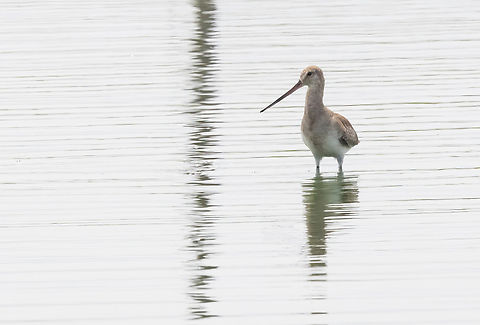
Appearance
Adults have long dark legs and a long pink bill with a slight upward curve and dark at the tip. The upper parts are mottled brown and the underparts are chestnut. The tail is black and the rump is white. They show black wing linings in flight. The legs and feet are bluish-grey.Naming
An 18th-century name for this bird was red-breasted godwit. The English term "godwit" was first recorded in about 1416–7 and is believed to imitate the bird's call.Status
Their numbers were reduced by hunting at the end of the 19th century.Reproduction
Their breeding habitat is the far north near the tree line in northwestern Canada and Alaska, also on the shores of Hudson Bay. They nest on the ground, in a well-concealed location in a marshy area. The female usually lays 4 olive-buff eggs marked with darker splotches. Incubation period is 22 days. Both parents look after the young birds, who find their own food and are able to fly within a month of hatching.Food
These birds forage by probing in shallow water. They mainly eat insects and crustaceans.Migration
They migrate to South America and the Caribbean. These birds gather at James Bay before fall migration. In good weather, many birds make the trip south without stopping. They are vagrants to Europe, Australia, and South Africa.They can perhaps be most easily seen in migration on the east coast of North America where they can be plentiful in migration in late July through early August.
Evolution
Their numbers were reduced by hunting at the end of the 19th century.References:
Some text fragments are auto parsed from Wikipedia.